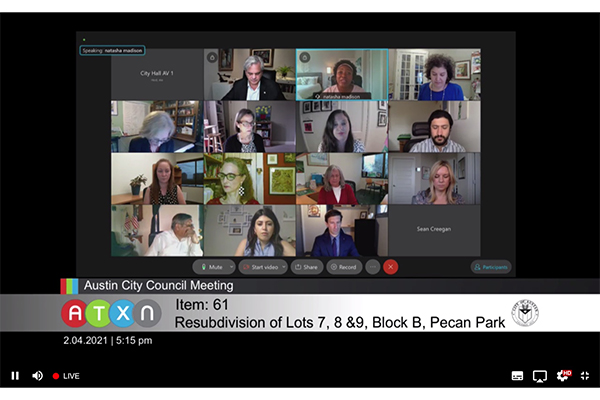Editor's Note: This story first appeared in The Daily Texan's February 5 online edition.
On Thursday, Austin City Council voted to purchase Candlewood Suites to house people experiencing homelessness a week after approving the purchase of another hotel.
Candlewood Suites will be purchased for $9.5 million and is in northwest Austin. Texas Bungalows Hotel & Suites was approved for purchase for $6.5 million on Jan. 27. Combined, the two hotels will hold 148 housing units.
The funding for the purchase of the hotels is part of the Housing & Planning Department’s 2018 General Obligation Bonds. The funding for operations of the hotels, including resident support, will come from funds diverted from the police department budget as part of the city’s Reimagining Public Safety effort.
These hotels will not be homeless shelters but permanent supportive housing much like apartment complexes, with individualized assistance for residents, District 4 Council Member Greg Casar said.
“There will be medical care, mental health support, counseling for any folks that need job placement, support and case management for every single person,” Casar said.
Candlewood Suites is located in District 6, Council Member Mackenzie Kelly’s district, in Northwest Austin. Kelly originally requested the vote on Candlewood Suites be postponed so she could consult her constituents. Since last week, Kelly said she visited a protest by residents against the hotel purchase on Sunday and hosted a virtual town hall on Jan. 27.
At Thursday’s meeting, Kelly made a motion to postpone for 180 days at the request of the Williamson County Commissioners Court, but no other council member supported the motion. Kelly said she is not against permanent supportive housing.
The average age of the residents who will live in the facility is expected to be 54, according to the meeting. The city is prioritizing unhoused residents who are most at-risk for COVID-19, Casar said.
The Candlewood Suites purchase, located in a mostly residential area, sparked concern from some in the area.
Some speakers said they favored the option of alternative housing solutions, such as purchasing land to build housing or park RVs, and some expressed concern for the cost of the hotel.
“This strategy of converting hotels can get us the speed that the community expects, and no matter how much folks talk about the fact that this costs us money up front, we’ve seen study after study (show) that getting people into permanent supportive housing saves us tens of thousands of dollars per person,” Casar said.
According to a 2015 study by the City of Austin and the nonprofit Ending Community Homelessness Coalition, Austin public systems will save an estimated $901,695 per year by adding permanent supportive housing.
University Democrats President Brandon Bradley said he is glad the city council is willing to take bold steps on the issue.
“When you will provide an assurance (to people experiencing homelessness) that the city has your back and is going to make sure that you're able to have access to these services, which is what happens when they have stable permanent housing, then both common sense and empirical literature (are) clear that we can actually long-term reduce chronic homelessness,” government senior Bradley said.





















